Testimonials and reviews play a powerful role in getting new patients and customers, but they do so much more than that. Showcasing reviews benefits your local SEO strategy, which means Google likes to see them.
When Google is happy, it typically means your audience is happy, and that ultimately makes you happy.
This episode goes over:
Where are patients / customers reading reviews
How often are consumers reading online reviews?
How many sites do consumers check reviews on?
What are the most important review factors
Do your reviews need to all be positive
Do you really need to reply to reviews
What star ratings do people actually expect to see
Does the number of reviews you have actually matter
AIs role in reviews
Can customers tell if reviews are fake
How customers write reviews
How to collect reviews
How to repurpose reviews
The information provided is based on a comprehensive survey conducted by BrightLocal, which explores the evolving trends, consumer behaviors, and preferred platforms for online reviews in 2024.
Online Reviews: Trends, Behaviors, & Platforms
In today's digital age, online reviews wield immense power, influencing consumer decisions and shaping brand perceptions.
Understanding the intricacies of online reviews is paramount to clinic owners' maintaining a stellar reputation and attracting new patients.
In this episode, we'll delve into key insights derived from the recent BrightLocal Survey, shedding light on emerging trends, consumer behaviors, and best practices for harnessing the potential of online reviews in 2024.
The Evolution of Online Reviews
Online reviews have significantly evolved, becoming indispensable resources for consumers seeking information about local businesses.
According to the BrightLocal Survey, 91% of customers acknowledge that local branch reviews impact their overall perception of a brand, underscoring the critical importance of cultivating a positive online reputation.
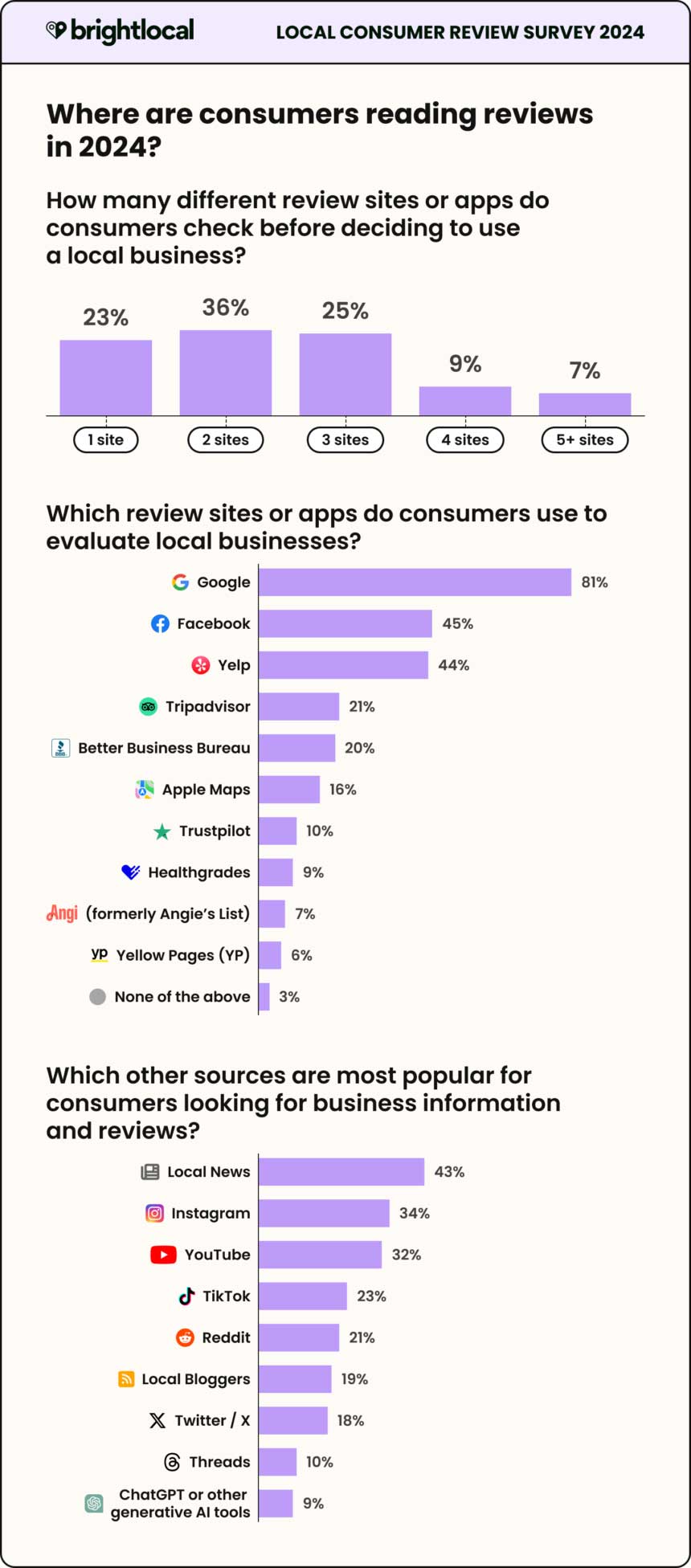
Image from BrightLocal
Consumer Expectations & Preferences
One of the most striking findings of the survey is the significance of review responses. An overwhelming 88% of customers express a preference for businesses that respond to all their reviews.
Whether positive or negative, timely and personalized responses demonstrate a commitment to customer satisfaction and foster trust.
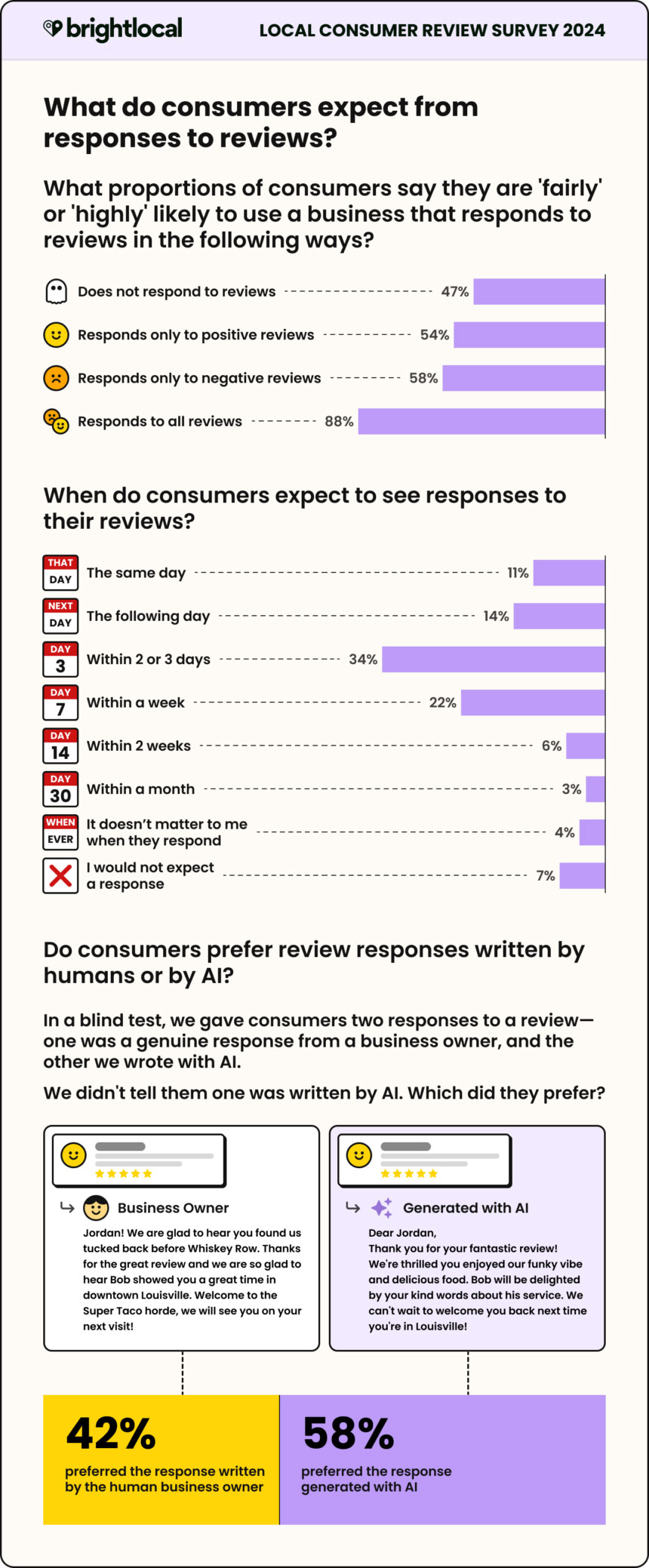
Image from BrightLocal
Furthermore, the role of Artificial Intelligence (AI) in review responses cannot be overlooked. Surprisingly, 58% of customers favor AI-generated responses over human-generated ones.
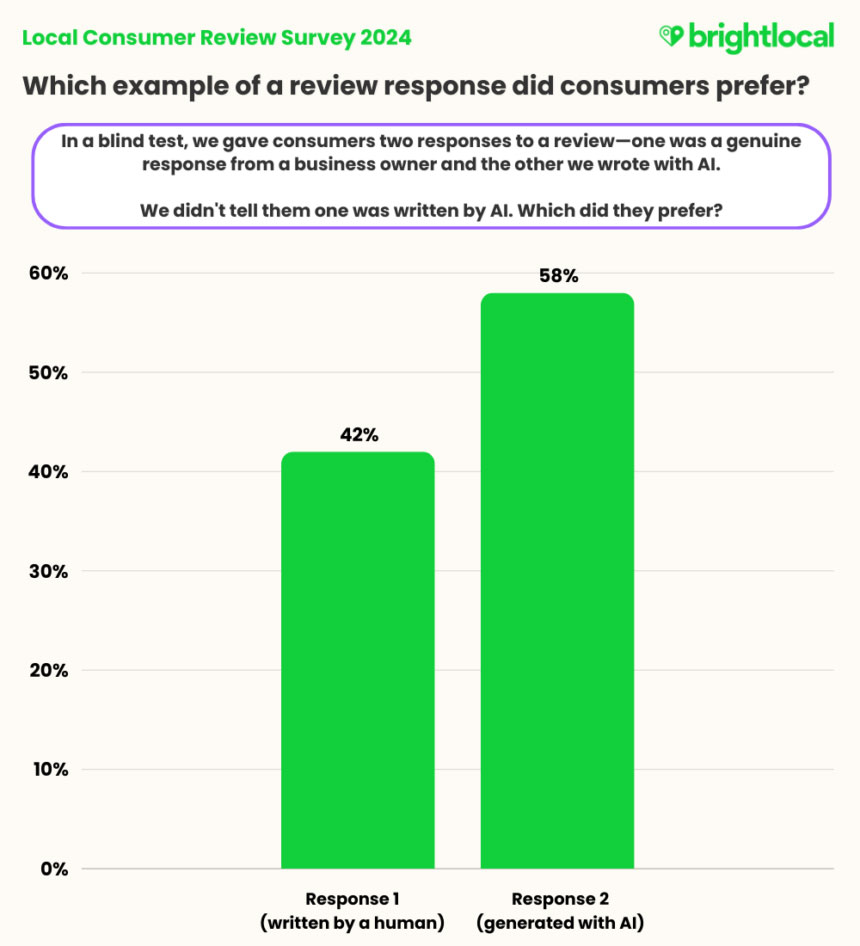
Image from BrightLocal
Leveraging AI tools can streamline the review management process while ensuring consistency and professionalism in responses.
Optimizing Review Listings
In an era where consumers consult multiple platforms before making purchasing decisions, optimizing review listings across key platforms is essential.
Google remains the dominant player, with 81% of consumers relying on it for business reviews. However, platforms like Facebook and Yelp also wield considerable influence, proving a need for a multi-channel approach to review management.
As a clinic owner, prioritizing platforms such as Google Business Profile, Apple Maps, Yelp, and Facebook can enhance your online visibility and credibility. Consistent NAP (Name, Address, Phone Number) information and compelling descriptions can further bolster your listings' effectiveness.
What’s the Minimal Star Rating I Can Have & How Many Reviews Do I Need?
You may think these are silly questions. Obviously, you want all 5-star ratings and a million reviews. Actually, though, that’s not really the case.
According to most consumers, they’ll happily work with clinics with four stars and above. Remember, it’s about trust here, and you can’t please everyone all the time. If you have a million 5-star reviews, your credibility may be in question.
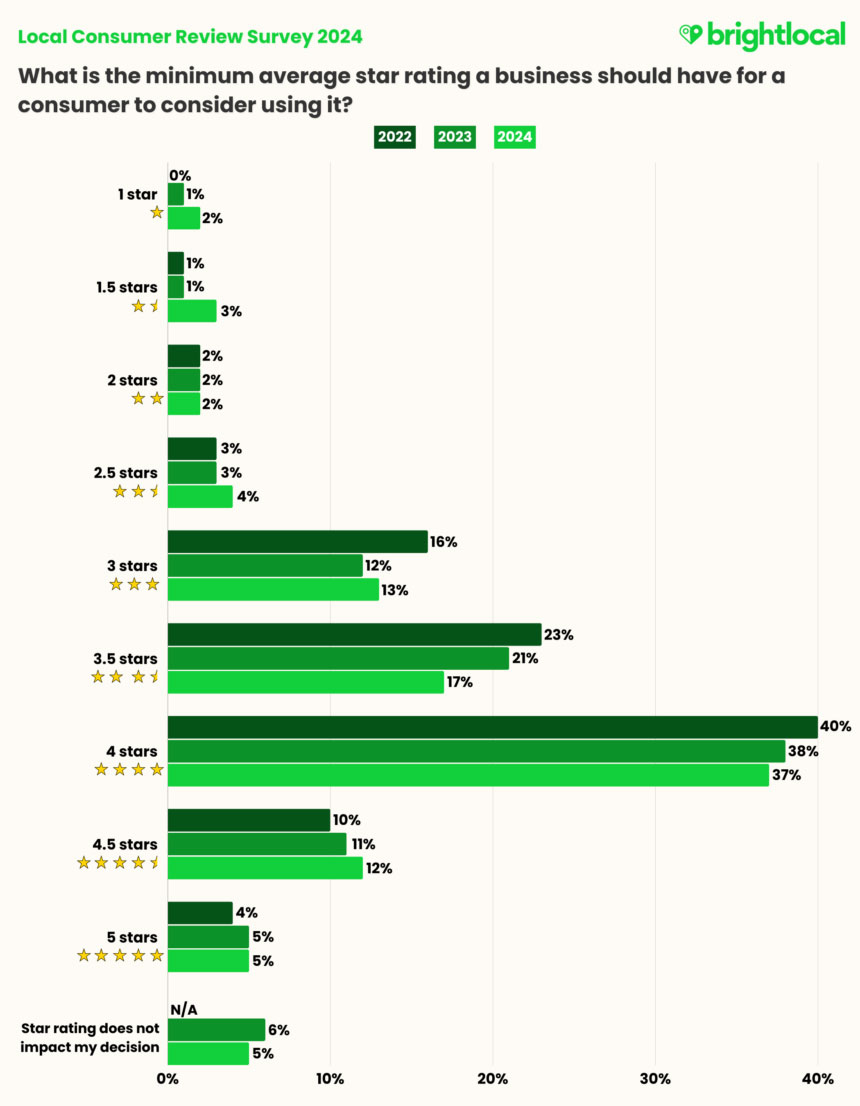
Image from BrightLocal
The number of reviews needed to make a good impact on your local SEO (and your target audience) is holding strong at 20-49. You want a healthy amount so your users have options and can easily jump around, but they’ll likely not read each one, especially if you have hundreds.
Pro tip: Always get reviews, keep them for your reference and on the back burner, then update the old with the new when appropriate.
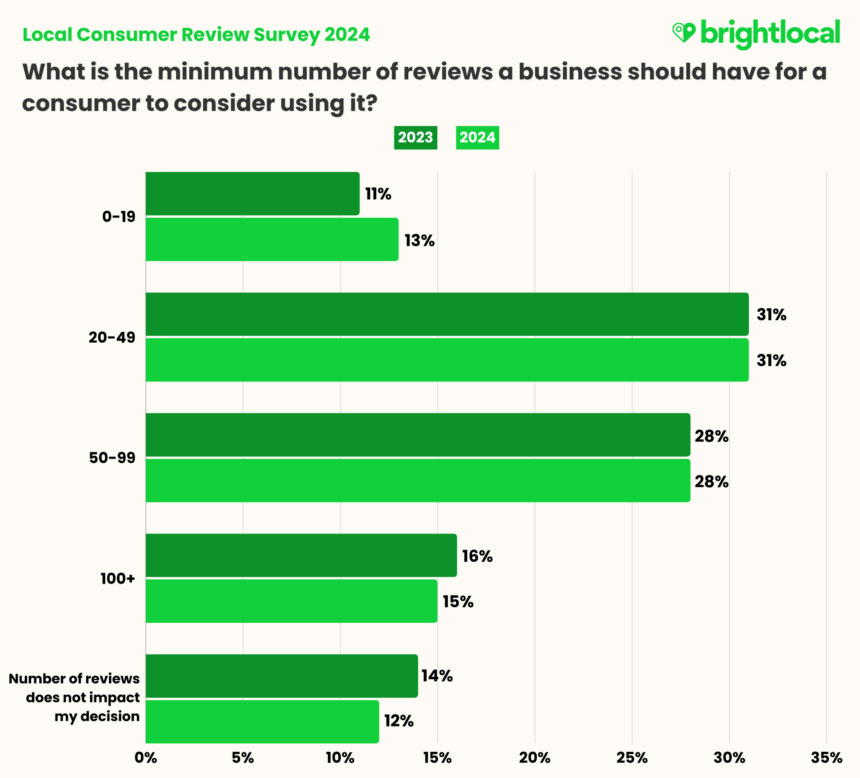
Image from BrightLocal
When to Contact Patients or Customers for Reviews
Asking your patient or customer for a review between three and seven days is the sweet spot. They have time to see how your services worked for them, and the experience is fresh on their mind.
And don’t forget to make leaving a review super easy. Send out a reminder, create a question list, a form, give links, or whatever makes the task go smoothly!
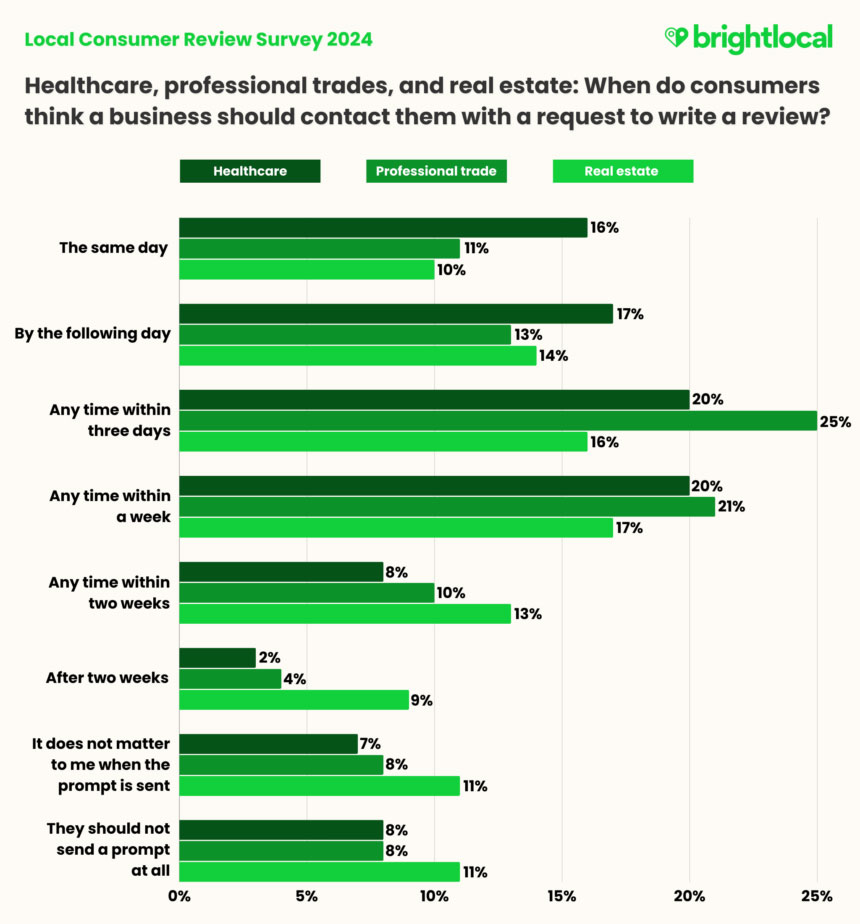
Image from BrightLocal
Maximizing the Impact of Reviews
Collecting reviews is just the first step; maximizing their impact is equally crucial. Repurposing reviews across your website and social media platforms can amplify your reach and influence.
Strategically placing testimonials on relevant service pages and creating graphics for social media can showcase your patients' positive experiences, thereby instilling confidence in prospective clients.
Getting Reviews Like a Boss
Online reviews will continue to shape consumer decision-making in 2024. Clinic owners can strengthen their online presence and cultivate a loyal patient base by understanding consumer expectations, optimizing reviews to enhance local SEO, and leveraging reviews effectively.
As you navigate the world of online reviews, remember the insights gleaned from the BrightLocal Survey—they serve as invaluable guides on your journey towards practice success.
Want to learn more about SEO and how to get in front of the right audience? Let’s connect. Book your free discovery call today!
Related Resources for Online Reviews: Trends, Behaviors, & Platforms
- Local Consumer Review Survey 2024: Trends, Behaviors, and Platforms Explored
- Local Listing Bundle
- Google Business Profile: The Ultimate Guide to Optimize Your GBP Listing
- 4 Online Listings that Will Help Your Clinic Get More Patients
- Yelp SEO for Chiropractors & Clinic Owners
- Why You Need to Invest Some Time in Your Apple Maps Listing
- A Chiropractor’s Guide to Optimizing Your Apple Business Connect Place Card
Watch Online Reviews: Trends, Behaviors, & Platforms
Online Reviews: Trends, Behaviors, & Platforms - Podcast Transcript
Hello and welcome to this episode of the Propel Your Practice Podcast. I'm your host, Darcy Sullivan, and in today's episode, we are talking all about online reviews.
In fact, we're going through trends, behaviors, platforms, and so much, and all of this is based on a new customer review survey that was done by BrightLocal. I'll include the link to the survey and its findings in the notes section associated with this episode.
So today, we're going over tons of stuff. We're going to talk about:
- Where patients or customers go to read reviews
- How often customers are reading reviews online
- How many sites they go to to read the reviews
- What are the most important review factors?
- Do you really need to have all positive reviews?
- Do you really need to reply to reviews?
- What star ratings are people actually expecting to see when they look at reviews?
- Do the number of reviews you have actually matter?
- We're going to chat about the role of AI when it comes to reviews
- We're looking at some data around if customers can tell if reviews are fake
- We're looking at how customers write reviews
- We're going to talk about setting up a system for collecting reviews
- And we're going to talk about how to repurpose and leverage the reviews that you have on your website and social media
Well, before we dive in, I want to let you know that we have a handy dandy guide that walks you through four of the major listings that we'll be talking about today, how to optimize those listings, and we'll include a link to that in the resources section, or you can visit propelyourcompany.com/local-listings and that bundle walks you through optimizing, again, some of these top listings that we're going to be talking about today.
As I mentioned, this is all coming from, or stirred up from, a recent article on BrightLocal. So what we're going to do today is: I'm going to kind of skim through this article, go through some of the key findings with you, but because the majority of the audience that's listening to this are chiropractors, acupuncturists, physiotherapists, and other clinic owners, we're going to take the information and the findings and talk about how you can adapt that to your specific business, because, you know, the findings include things like Amazon and we know that people are not going to Amazon to look for your specific business offerings.
So let's talk first about some of the key themes and findings from this recent article, and that is that local reputation is big for brands.
91% of customers say local branch reviews impact their overall perception of a brand. It makes sense that business review responses are critical, and you're going to see later on as we talk about how AI relates to responding to reviews, but 88% of customers would use a business that replies to all of its reviews, compared to just 47% who would use a business that doesn't respond to all of their reviews.
That's huge, right? I think that a lot of us think about: “Well, do I really need to respond to all these reviews,” and I think that that number just speaks for itself in saying, yeah, you do.
As I mentioned, we're going to talk about AI, but it was interesting. In this survey, 58% of customers preferred the AI-written reviews for how somebody responds to a review versus a human-generated one
And I've been saying this for such a long time, if you are a chiropractor and people are leaving Google reviews for you constantly, what I suggest that you do is come up with a template, kind of divide up the reviews. If you're getting a handful of reviews for chiropractic care for back pain, if you're getting a handful of reviews of a specific service that you're offering, or testimonials that people are leaving, please provide me with 10 to 12 responses for them and go ahead and like have that number of AI-generated responses that you can copy and paste, keep them in a good old Google Doc and copy and paste them as needed.
But I find it really interesting here that people actually prefer the AI version of the response to the reviews, and I think there's a number of factors in there. One, they're just cleaner, the grammar is just cleaner, they're a little bit more detailed, they're just a little bit more pulled together. So keep that in mind. I think that's really interesting.
Also, social media continues to be a big part of customers' business research. 34% of customers use Instagram. 22% use TikTok. Now, if you're a clinic owner, those numbers are probably going to be a little bit different, but I did want to include them because they were a part of the findings from this survey.
Customers typically use two or more sites to check business reviews. That's another one that you want to keep in mind.
A lot of time, clinic owners are only focusing on Google for collecting their reviews, and there was another episode of the podcast that I did on four places to focus on collecting reviews. It really talked about even how Yelp works. I know a lot of clinic owners don't love Yelp, but Yelp reviews get pulled to other locations where they're displayed, like your Apple Business Connect and your Bing Business listing.
So there really are critical reasons why you want to consider collecting reviews more than just in one location.
Okay, I'm going to kind of just scan through this very informally, here. I didn't really put together any notes as I was prepping to record this. I just wanted to review this with you together and talk about how it can relate to your clinic. So we're going to go through again. We're following the BrightLocal survey here.
Where are customers reading reviews in 2024? How many different sites or apps do they go to when it comes to deciding what local business they're going to use? So 23% said one site, 36% said two sites, 25% said three sites, and then it drops off from there.
And which sites or apps are people using to evaluate these businesses? That would be Google at 81% no surprise there. Facebook at 45%, Yelp at 44%, and then it goes down from there.
Some of these absolutely do not apply to clinic owners. Nobody is going to go to TripAdvisor and expect to see your listing or Angie's List, so we don't need to go through all of these, but some others that are listed on here include Apple Maps; surprisingly, Bin Business listing wasn't included on here.
But listen, I say, if you are going to go through and optimize and take time to optimize and collect reviews–it's one thing to collect reviews, it's also another thing to optimize your listing–so if you're going to go out there and collect reviews for Google, for Yelp, on Facebook, you might as well take the time to optimize your listing to make sure that people are actually seeing it when they're searching for the services that you offer.
Which other sources? I don't think this really absolutely pertains to you because some of it says local news. While I do believe clinics can be highlighted in local news, it's not really where people are going to search for a chiropractor or an acupuncturist right here, right now. They usually are more apt to go to Google or those other locations.
So the next item on here is: How often are customers reading online reviews? And honestly, it stayed pretty similar from 2022 to 2023 to 2024. 33% are at always for 2024, regularly is at 42%, and then it drops off to 22% for occasionally and 3% for never.
Where are they reading the reviews online? Here again, the numbers are kind of slightly changing from 2022 to 23 to 24, but really holding on strong is our good old friend Google, followed by Facebook and Yelp; down later in the listing is the Better Business Bureau and Apple Maps, and then Healthgrade listing and Yellow Pages.
So we do want to make sure, again, that we are collecting reviews, not just on that one site, because the next question is: How many sites do customers check on reviews? 23% said one, 36% said two, 25% said three, and then it drops after that.
There's a section in here on how customers interact with review platforms and functionality. This kind of relates to how are people going to the reviews. Let's say, Google is using or sorting the reviews, and they're sorting them by the newest. They're sorting them by the highest rating. They're looking for the newest, they're sorting them by the highest rating, they're looking for the photos, they're searching reviews for a specific keyword, they're sorting the reviews by most relevant, they're sorting them by lowest rating, and they're filtering them by keyword.
And I always say this: If you have an opportunity, I know you can't write a review for somebody, but if you can get somebody to leave a review that includes the keywords that you want to rank, for, it is, surprise, going to help you rank for those keywords when people leave reviews. Just saying, “Great experience” that doesn't really highlight the services that you offer.
So again, if they're able to use those keywords, other people are going to relate to them more often and it's going to be easier for you to rank and show up for some of those keywords.
Now, I don't know about you, but I am one of the people that always sorts by the lowest rating first.
I always want to read the worst experiences, not only because I'm looking at the worst experiences but I'm looking at the dates that those took place and how the business, the clinic, the establishment, reply to those negative reviews, to see if it's just a crazy person that came in or if their customer service is really bad in the way that they reply.
So, we don't just want to reply to those positive reviews; we also want to make sure that we reply to the negative reviews.
So, what are the most important review factors? When asked in the survey, what do customers expect from responses to reviews? What proportions of customers say they are fairly or highly likely to use a business that responds to reviews in the following ways? People, again, like to see you respond to all reviews.
In fact, if somebody doesn't respond to reviews, the percentage is at 47, and then it starts to go up. If you're a business that responds to only the positive reviews, it's at 54%. If you respond to only the negative reviews, it's at 58%, but if you respond to all reviews, you're in the 88% range.
When it comes to how likely a person is, or what somebody expects when it comes to the response to the reviews, this is a good one.
Have you ever wondered how quickly you should respond to your reviews? So, when customers were asked how quickly they feel like they should see a response to a review, the highest percentage was 34%, saying within two to three days, followed by the seven-day window of 22%, and then the next day at 14%, and then followed by that same day at 11%.
Listen, it's not easy to take time out of every single day to respond to reviews. So I think if you were to budget and say, okay, on Mondays, we take a percentage of time out and respond to all the reviews, that would be a great way to handle the responses to reviews.
And again, we talked about the number of people that prefer an AI-generated response to the review, just because it usually sounds better. So if you want to leverage your time, again, use the AI tools like ChatGPT to have them help you write some quality responses to the reviews, and just carve out time once a week to do that.
Which review factors make customers feel positive about using a business? So, again, we can't direct people as to what type of review to leave for your business, but I think it's interesting to really get in the mindset of a patient or a customer and see what triggers them and what they want to see when it comes to reviews.
At the top here, we have that the written review describes a positive experience. Next up, following that is that the review has high star ratings. I don't think there's any surprise to that. Then, that the business owner has responded to the reviews, that the review has been posted within the past month, that the reviewer's name is stated, that it's not an anonymous listing, that they have a photo or a video accompanying the product or service, that the review has spelling and grammar that is of high quality. And that the review is long and detailed.
What star ratings do customers actually expect to see, and they've got listed here the numbers for 2022, 23, and 24. Let's just focus on 2024. So, out of five stars, most expect to see an average of four stars, that's at 40%, followed by, I think this is interesting, 3.5 stars at 23%.
Then we have three stars at 16%, followed by 4.5 stars at 10%. So, I think this goes to show you that I think we're in a world where people know that not everybody is going to leave a positive review and that if all you see are five-star reviews, that you probably are going to question if all of those reviews are real. But we do want to try to aim for the star rating overall to be between the four to five points when it comes to the average.
The next question was: Does the number of reviews really matter? And I think this is interesting, what is the minimum number of reviews a business should have for a customer to consider using it? And here we have 31% saying between 20 to 49, followed by 28% saying between 50 to 99.
Next up is relevancy; how frequent or how recent were those reviews? And I think we've all done that when we've looked at a company, and we've said, “Oh, well, they've got great reviews, but they're all from five years ago, nobody really cares about them.:
So, most people like to see reviews that are within the past two weeks to the past month. So, as you're collecting reviews, strive to collect a couple of new reviews every single month, and we already talked about this at the beginning, but how likely are customers to use the business based on how it responds to its online reviews, and here it states 88% of people are more likely to use the business if it responds to both the positive and the negative reviews.
Now, let's take a minute to talk about fake reviews. In the survey, it was found that customers are confident they've seen fake reviews across multiple platforms. I don't think that's any kind of a surprise, but where is it that people think that they see the most fake reviews? Well, first Amazon, followed by Facebook, then Google, after that, it's Yelp, tripadvisor, Apple Maps, and the Better Business Bureau.
This one is interesting: What types of reviews are people leaving? Are customers writing reviews? And, if so, for what? We're seeing that 38% of those leaving reviews are related to a positive experience.
This survey goes on to talk about a number of other things. I just wanted to pull out some of the top, key things that I think are important when it comes to clinic owners and collecting reviews, understanding expectations for reviews that patients might leave.
I know that a lot of clinic owners have systems in place to help them collect reviews. This next question that was asked specifically regarding healthcare was: When does a customer think a business should contact them to request that they write a review? And again, specific to health care, it was: 16 said the same day, 17 said by the following day, 20% said within three days, and 20% said within a week. And then it drops off from there.
So if you do have a system in place to collect reviews, you really do want to do those within the first week period of time after somebody has visited you.
Now a couple other things that I want to point out from here is, after you've collected these amazing reviews, we, again, want to make sure that we've actually optimized the listings, so you can grab that local guide that I mentioned that we have on our website, or you can visit propelyourcompany.com and do a search for local listings.
But it's not just a point of gathering the reviews, but also, again, optimizing those listings.
And, as a clinic owner, I would strongly recommend that you focus on the key ones: Obviously your Google Business Profile listing, your Apple Maps, your ABC Connect Place Card, your Yelp listing, your Facebook listing, Bing Places listing, Healthgrades listing, and your Yellow Page listing. If I had to prioritize them, I would say keep an eye on those.
We want to make sure that our NAP, which is our name, address, and phone number, is correct and matching in all of those listings. Those would be your citations. And we want to make sure that your descriptions are optimized as well, that your images are current and that you're following best practices.
Now, we don't just want these reviews to sit on Google or Yelp or other places. You want to repurpose them as well. So, make sure that you're leveraging them by actually using them on your website.
I suggest that you place them strategically, meaning that if somebody leaves a testimonial for a specific service, that instead of just randomly placing that testimonial on your website, that you place it on that specific service page.
You can also repurpose these testimonials by using them as graphics for social media or, again, by using them on your website. All right, well, I hope you enjoyed this episode of the Propel Your Practice Podcast. That's it for now.
Get our next podcast episode delivered directly to your inbox:
We'll email you when we release new episodes.
Darcy’s SEO strategies are easy to implement and effective. She’s the #1 SEO expert I refer to whenever I need help with my rankings.
SEO queen! I can’t thank Propel and Darcy enough for holding my hand through the SEO process! I’m loving the podcast and all the insight! Also loving that my business is now getting the brand awareness and sales I’ve always wanted!
Wow! Clear, concise and impactful. Excellent details and tips - already seeing a return!! Worth the 20 min listen.
Sponsors
This episode of the Propel Your Practice Podcast is brought to you by Propel Marketing & Design. Propel Marketing & Design helps Chiropractors, Acupuncturists, Physical Therapists, Wellness Practitioners, and other clinic owners improve their website rankings.
Do you have a suggestion for an upcoming topic or guest?
We love a good suggestion and we’re happy to take yours! Tell us about a topic you want to hear more about or a guest you think would make an impact here and we’ll take care of the rest.
Interested in sponsoring a Propel Your Practice Podcast episode?
If your organization would be a good fit for our target audience, we’d love to work with you. Hit the link below and let’s talk.


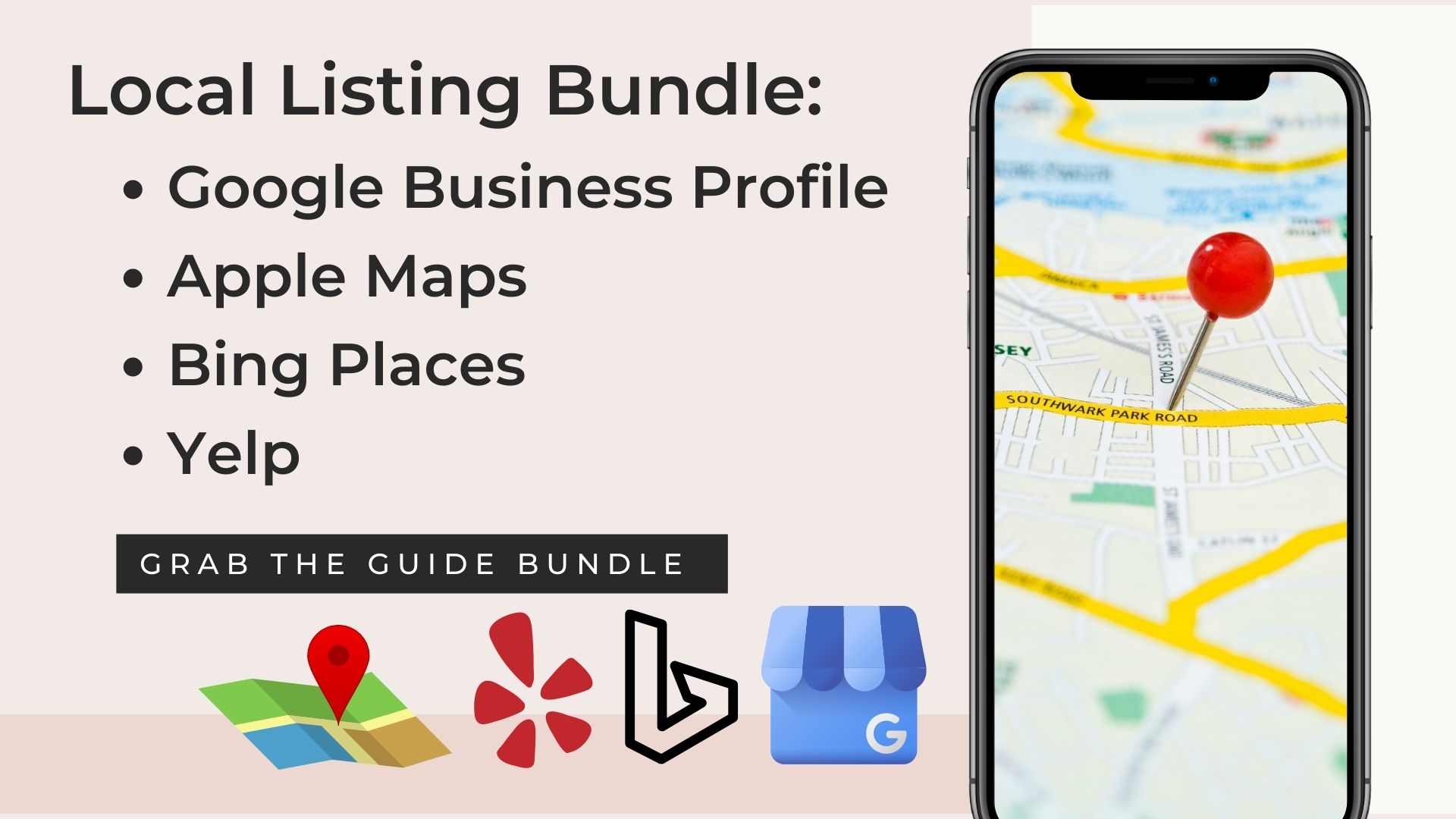







![How to Write a Professional Chiropractic Bio [Template Included]](https://propelyourcompany.com/wp-content/uploads/write-a-bio-500x383.jpg)

